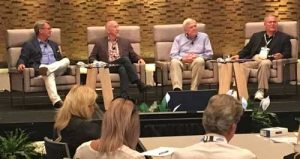The independent sales organization business is one that has spawned multimillion-dollar fortunes for numerous entrepreneurs. But perhaps it’s time for the industry to begin thinking beyond pure profit, merchant-acquiring executives suggested Thursday.
The executives participated in a panel dubbed “Payments Doing Good” at the MidWest Acquirers Association annual conference in Chicago. Panel moderator Mark Dunn, an MWAA co-founder and currently its treasurer, said the association’s board of directors has approved giving the charities supported by the three panelists $2,000 each.
The panelists included Robert O. Carr, who founded the payments provider Beyond in 2017 after serving as chief executive of the big merchant processor Heartland Payment Systems Inc., which was sold in 2016 to Global Payments Inc. In 2003, Carr founded the Give Something Back Foundation Inc., or Give Back, a charity that helps low-income youth attend four-year colleges. The foundation is now the beneficiary of Carr’s holdings in Beyond.

Give Back has generated $35 million for students since its founding, according to Dunn. Carr says the program works with 27 universities and identifies prospective scholars among at-risk youth in ninth grade, requiring them to enroll in college-prep course in high school. The foundation combines its own tuition funding with federal and state grants to cover everything but books and travel. Students have a 91% graduation rate, according to Carr.
“We all have the things we believe in,” Carr said. “I think the best thing you can give to somebody who otherwise thinks they have no chance is to give them the gift of a college education.”
Also speaking was Jeff Marcous, a veteran acquiring executive who is the co-founder and CEO of the Vancouver, Wash.-based ISO Dharma Merchant Services. Dharma is a Sanskrit word that doesn’t translate directly into English, but it suggests life’s path, said Marcous, a practicing Buddhist.
The company is one of about 2,500 so-called certified benefit corporations that adhere to standards set by the non-profit B Lab. The standards cover everything from treatment of employees to environmental stewardship to transparency and charitable works, according to Marcous. Last year Dharma donated about $250,000 to non-profits, he said.
“I can tell you my staff has been transformed by the things we do,” he said.
The third panelist was Andy Kinnecom, president and CEO of Wickford, R.I.-based Swipe for a Cause, an ISO that donates 5% of its revenues to a Rhode Island hospice. Kinnecom, who spent most of his career in the hotel industry, founded the ISO eight years ago specifically to improve hospice care after several deaths among his family and friends, including his wife of 30 years. “When she died I was, basically, totally shell-shocked,” he said.
Kinnecom founded the company with a long-time high-school friend, a woman who had been frustrated by the state of hospice care after the death of her uncle. She’s now his wife.
In its first year the ISO gave away all of its earnings, a model Kinnecom said wasn’t sustainable. “We were totally green, wet behind the ears,” he said.
It’s extremely difficult for individuals alone to effect social change, and “governments will not get together” to promote it, Marcous said. But private enterprise can be marshaled for good causes, he believes. “If business gets behind this idea that business can be a force for good, maybe we’ll have a chance.”
Carr, who received a warm reception from the MWAA crowd, made no mention on the panel of his current legal travails with the Securities and Exchange Commission, which has accused him and his girlfriend of insider trading in connection with Heartland’s sale to Global. He previously denied the accusations and reiterated that position to Digital Transactions News Thursday.
“I’m innocent of the charges,” Carr says. He declined to discuss the case further other than to say there could be some developments “in the fall.”



